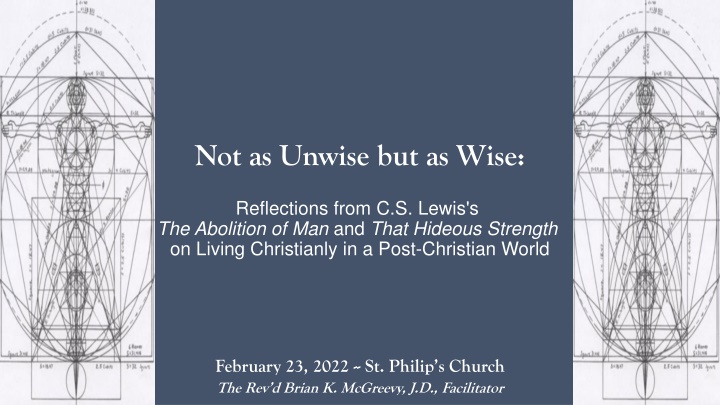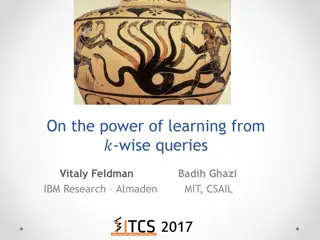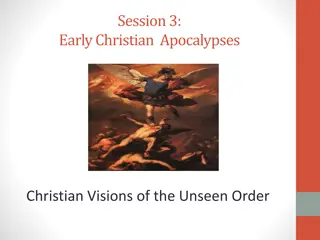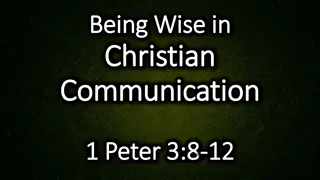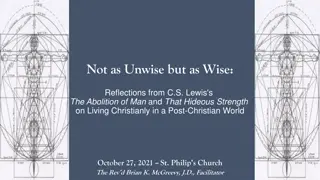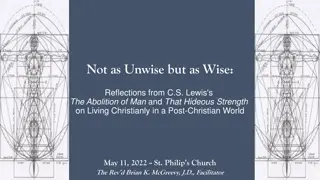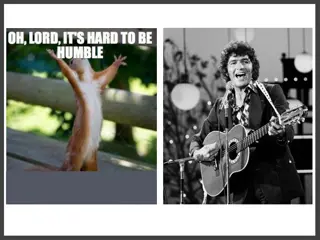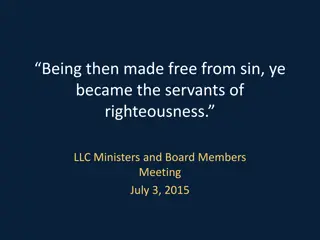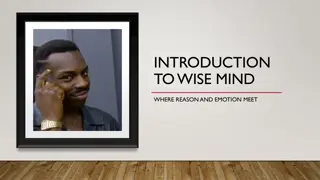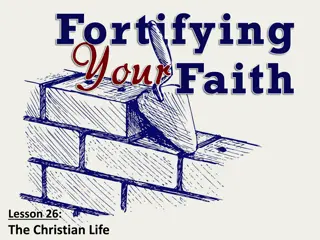Living Christianly in a Post-Christian World: Wise Reflections
Reflections inspired by C.S. Lewis's "The Abolition of Man" and "That Hideous Strength" for navigating the challenges of living out a Christian faith in a world that drifts from traditional values. Delve into key themes, plot summaries of the Ransom Trilogy, and methods to engage with the texts. Explore weekly discussions, strategies for reading, and the application of hope and wisdom rooted in Scriptures for modern relevance.
Download Presentation

Please find below an Image/Link to download the presentation.
The content on the website is provided AS IS for your information and personal use only. It may not be sold, licensed, or shared on other websites without obtaining consent from the author.If you encounter any issues during the download, it is possible that the publisher has removed the file from their server.
You are allowed to download the files provided on this website for personal or commercial use, subject to the condition that they are used lawfully. All files are the property of their respective owners.
The content on the website is provided AS IS for your information and personal use only. It may not be sold, licensed, or shared on other websites without obtaining consent from the author.
E N D
Presentation Transcript
Not as Unwise but as Wise: Reflections from C.S. Lewis's The Abolition of Man and That Hideous Strength on Living Christianly in a Post-Christian World February 23, 2022 -- St. Philip s Church The Rev d Brian K. McGreevy, J.D., Facilitator
For at one time you were darkness, but now you are light in the Lord. Walk as children of light (for the fruit of light is found in all that is good and right and true), and try to discern what is pleasing to the Lord. Take no part in the unfruitful works of darkness, but instead expose them. For it is shameful even to speak of the things that they do in secret. But when anything is exposed by the light, it becomes visible, for anything that becomes visible is light. Therefore it says, Awake, O sleeper, and arise from the dead, and Christ will shine on you. Look carefully then how you walk, not as unwise but as wise, making the best use of the time, because the days are evil. Therefore do not be foolish, but understand what the will of the Lord is. Ephesians 5: 8-17
How to approach this class: --On the beach --Snorkeling --Scuba diving --Email list How to read That Hideous Strength: --One chapter at a time --Make a chart of characters --Look for and note where themes from The Abolition of Man appear What we ll be doing each week: --Examining context and establishing a framework for appreciating these books --Unpacking the meaning of Lewis s works --Exploring their relevance for today --Considering how we can respond with practices of Hope and of Wisdom rooted in the Scriptures
REVIEW FROM PREVIOUS CLASSES Summary: Main theme of each chapter in The Abolition of Man 1. Men without Chests : The importance of objective values and the poison of subjectivism 2. The Way : Why the Tao, or Natural Law, is the sole source of all value judgments 3. The Abolition of Man : Man s control of Nature is in reality a means for some men (Conditioners) to control other men, using Nature as their instrument. To see through (deconstruct) all things is not to see at all. PLOT SUMMARY OF THE RANSOM TRILOGY Adapted from Taylor Dinerman, The Space Review -- Out of the Silent Planet, tells how Ransom, a Cambridge don on holiday, is kidnapped by the physicist Weston and his partner Devine, a sleazy businessman, and taken to Malacandra (Mars), supposedly as a human sacrifice. -- Perelandra, the name Lewis gives to Venus, is also the title of the second book in the series. Retelling the story of Adam and Eve, it is the most explicitly biblical of the three. Weston plays the role of the serpent sent to tempt the woman who is to become the mother of the world into rejecting God s will. Ransom is sent by the Oyarsa to challenge the evil one and to save Venus from the fate of Earth. -- That Hideous Strength combines a sordid tale of intra-university politics, Arthurian legend, and spiritual combat. In a small British University town, one of the colleges finds itself seduced and then engulfed by the newly established National Institute for Coordinated Experiments (N.I.C.E). This organization is secretly controlled by a pair of initiates, who plan to revive the wizard Merlin from his long, enchanted slumber and to use his powers for their own purposes. TITLE SOURCE The shadow of that hyddeous strength, sax myle and more it is of length (Sir David Lyndsay: from Ane Dialog, describing the Tower of Babel) This is a tall story about devilry, though it has behind it a serious point which I have tried to make in my Abolition of Man. from Preface to That Hideous Strength
REVIEW OF CHAPTER 1, SALE OF COLLEGE PROPERTY --Jane and her dreams --Mark and the Inner Circle at Bracton College --The proposal to sell Bragdon Wood and Merlin s Well to the N.I.C.E. --The Dimbles and rumors of Merlin REVIEW OF CHAPTER 2, DINNER WITH THE SUBWARDEN --Mark and being included in Feverstone s confidence in disdain of Curry and Busby --The N.I.C.E. as the ultimate Inner Circle/Ring , focused on taking over and reconditioning the human race, controlling and subduing Nature, and exerting control over the interplanetary wars --Jane s fears and vulnerability, which she later rejects as unworthy --Mark s journey to Belbury and Jane s journey to St. Anne s-on-the-Hill REVIEW OF CHAPTER 3, BELBURY AND ST. ANNE S-ON-THE-HILL --doublespeak at the N.I.C.E.: does Mark have a job or not? Bill Hingest leaving the N.I.C.E. --Jane s visit to St. Anne s and her denial and her aversion to being interfered with --Mark s introduction to Fairy Hardcastle and the role of the N.I.C.E. secret police --Jane s resentment of how much she has had to give up in marriage; Mother Dimble s crisis REVIEW OF CHAPTER 4, THE LIQUIDATION OF ANACHRONISMS --the N.I.C.E. begin turning people out of their homes and destroying Edgestow s beauty --Bill Hingest is murdered the night he leaves the N.I.C.E. --Mark has a strange conversation with the N.I.C.E. mad parson and is assigned a propaganda project on destroying the village of Cure Hardy, only to find he is moved by its beauty --the invasive force of workers from the N.I.C.E. results in partially destroying the beautiful Fellows Room at Bracton
REVIEW OF CHAPTER 5, ELASTICITY --Mark, frustrated by the doublespeak and lack of clarity at the N.I.C.E., attempts a showdown with Wither, the Deputy Director, that does not go well at all, and Mark fears he may not only lose his position at the N.I.C.E. but also his fellowship at Bracton College. --Fairy Hardcastle warns Mark about complaining and offers him project work writing propaganda to rehabilitate the image of Alcasan, the criminal murderer. It becomes clear that the N.I.C.E. intends to operate through threats and coercion. --Meanwhile, Jane spends time with Camilla and Arthur Denniston, learning that they now live at St. Anne's, a community run by Mr. Fisher-King, a renowned man incapacitated by a wounded heel. The Dennistons urge Jane to join their company and use her gift of visions to help them for the good of all, but she refuses, wishing to guard her independence. REVIEW OF CHAPTER 6, FOG --As fog envelops Edgestow and the the N.I.C.E., Mark in desperation accepts a provisional job at the N.I.C.E. working on propaganda. --Mark is admitted to the Inner Circle at the N.I.C.E., learning he can get whatever money he wants from the N.I.C.E. steward. He begins work on propaganda supporting the riots being instigated by the N.I.C.E., suppressing his initial shock and moral repugnance, to assist the N.I.C.E. in getting emergency powers to suppress liberties. --In the village, Jane sees the man with pince-nez glasses and a pointed beard whom she recognizes from her latest dream. When he gets into a N.I.C.E. car, she immediately decides to go to St. Anne's-on-the-Hill, feeling "a total rejection, or revulsion from, this man on all levels of her being at once.
SUMMARY OF CHAPTER 7, THE PENDRAGON Adapted from Rudy Rentzel When Jane arrives at St. Anne's after fleeing the man from the N.I.C.E. she had seen in her dreams, she meets with the Dennistons, Ivy Maggs, and Grace Ironwood to describe her most recent dream about the awaking corpse, in which they are deeply interested. Miss Ironwood asks whether Jane is ready to meet the Director, and after her affirmative response, she explains that he might look young but wasn't, that he traveled where no one else had ever gone, and that he was often in great pain. When Jane enters the Director s room, "her world was unmade" as she is overwhelmed by the beauty and holiness of the man and his surroundings. Lying on a sofa in a sort of throne room, he looks like a 20-year-old golden boy, but his full beard and strength made it clear he was much older. One of his feet was bandaged, and "pain came and went in his face." His voice was seemed like sunlight and gold. While the Director wants Jane to join them, he says that Mark s role at the N.I.C.E. precludes this. Jane wishes to be a free agent and thinks she should be able to join regardless of Mark. The Director urges Jane to ask Mark to leave the N.I.C.E. and asks whether she wants to save Mark as well as herself. Confessing her unhappiness with Mark, Jane says Mark has lost her love and discusses this failure with the Director. When Jane left the Director, she felt like four different women: the first simply receptive to what he said; the second deeply resistant; the third - a sort of moral Jane - agreed with the outlook presented by the Director; and the fourth Jane (which trumped the rest) simply in a state of Joy after meeting the Director. When Jane arrived by train in Edgestow, riots have broken out and she is arrested by the N.I.C.E. police and taken to Fairy Hardcastle, who interrogates and tortures her to try to find out where she has been. Jane refuses to talk or say anything about the company at St. Anne s. By now, Jane felt enough loyalty to the group at St. Anne's that she did not want to disclose their location. When the rioting crowds burst into the police station, Jane escapes and is picked up by a kindly couple, who, distressed by her appearance, offer to take her home. Jane replies (somewhat to her surprise) that the Manor at St. Anne's was her home, so they take her there.
KEY PASSAGES FROM CHAPTER 7 A few minutes later Jane found herself once more in Grace Ironwood s room. Miss Ironwood and the Dennistons all sat facing her so that she felt as if she were the candidate in a viva voce examination. And when Ivy Maggs brought in the tea she did not go away again but sat down as if she also were one of the examiners. Now! said Camilla, her eyes and nostrils widened with a sort of fresh mental hunger it was too concentrated to he called excitement. Jane glanced round the room. You need not mind Ivy, young lady, said Miss Ironwood. She is one of our company. the company: one body Jane told them about the dream of the corpse (if it was a corpse) in the dark place and how she had met the bearded man that morning in Market Street; and at once she was aware of having created intense interest. Fancy! said Ivy Maggs. So we were right about Bragdon Wood! said Camilla. It is really Belbury, said her husband. But in that case, where does Alcasan come in? Excuse me, said Miss Ironwood in her level voice, and the others became instantly silent. We must not discuss the matter here. Mrs. Studdock has not yet joined us. membership in the company They passed out into the plain, narrow passage and thence up shallow steps into a large entrance hall whence a fine Georgian staircase led to the upper floors. The house, larger than Jane had at first supposed, was warm and very silent, and after so many days spent in fog, the autumn sunlight, falling on soft carpets and on walls, seemed to her bright and golden. On the first floor, but raised above it by six steps, they found a little square place with white pillars where Camilla, quiet and alert, sat waiting for them. There was a door behind her. He will see her, she said to Miss Ironwood, getting up. Is he in much pain this morning? It is not continuous. It is one of his good days. As Miss Ironwood raised her hand to knock on the door, Jane thought to herself, Be careful. Don t get let in for anything. All these long passages and low voices will make a fool of you, if you don t look out. You ll become another of this man s female adorers. Next moment she found herself going in. It was light it seemed all windows. And it was warm a fire blazed on the hearth. And blue was the prevailing colour. Before her eyes had taken it in she was annoyed, and in a way ashamed, to see that Miss Ironwood was courtesying.
This is the young lady, Sir, said Miss Ironwood. Jane looked; and instantly her world was unmade. On a sofa before her, with one foot bandaged as if he had a wound, lay what appeared to be a boy, twenty years old. On one of the long window sills a tame jackdaw was walking up and down. The light of the fire with its weak reflection, and the light of the sun with its stronger reflection, contended on the ceiling. But all the light in the room seemed to run towards the gold hair and the gold beard of the wounded man. Of course he was not a boy how could she have thought so? The fresh skin on his forehead and cheeks and, above all, on his hands, had suggested the idea. But no boy could have so full a beard. And no boy could be so strong. She had expected to see an invalid. Now it was manifest that the grip of those hands would be inescapable, and imagination suggested that those arms and shoulders could support the whole house. Miss Ironwood at her side struck her as a little old woman, shrivelled and pale a thing you could have blown away. The sofa was placed on a kind of dais divided from the rest of the room by a step. She had an impression of massed hangings of blue later, she saw that it was only a screen behind the man, so that the effect was that of a throne room. She would have called it silly if, instead of seeing it, she had been told of it by another. Through the window she saw no trees nor hills nor shapes of other houses: only the level floor of mist, as if this man and she were perched in a blue tower overlooking the world. Pain came and went in his face: sudden jabs of sickening and burning pain. But as lightning goes through the darkness and the darkness closes up again and shows no trace, so the tranquillity of his countenance swallowed up each shock of torture. How could she have thought him young? Or old either? It came over her, with a sensation of quick fear, that this face was of no age at all. She had disliked bearded faces except for old men with white hair. But that was because she had long since forgotten the Imagined Arthur of her childhood and the imagined Solomon too. Solomon for the first time in many years the bright solar blend of king and lover and magician which hangs about that name stole back upon her mind. For the first time in all those years she tasted the word King itself with all linked associations of battle, marriage, priesthood, mercy, and power. At that moment, as her eyes first rested on his face, Jane forgot who she was, and where, and her faint grudge against Grace Ironwood, and her more obscure grudge against Mark, and her childhood and her father s house. It was, of course, only for a flash. Next moment she was once more the ordinary social Jane, flushed and confused to find that she had been staring rudely (at least she hoped that rudeness would be the main impression produced) at a total stranger. But her world was unmade; she knew that. Anything might happen now. power of Beauty and Holiness
And the voice also seemed to be like sunlight and gold. Like gold not only as gold is beautiful but as it is heavy: like sunlight not only as it falls gently on English walls in autumn but as it beats down on the jungle or the desert to engender life or destroy it. And now it was addressing her. You must forgive me for not getting up, Mrs. Studdock, it said. My foot is hurt. power of Beauty and Holiness For the first few minutes after Grace Ironwood had left them alone, Jane hardly took in what the Director was saying. It was not that her attention wandered; on the contrary, her attention was so fixed on him that it defeated itself. Every tone, every look (how could they have supposed she would think him young?), every gesture, was printing itself upon her memory; and it was not until she found that he had ceased speaking and was apparently awaiting an answer, that she realized she had taken in so little of what he had been saying. I I beg your pardon, she said, wishing that she did not keep on turning red like a schoolgirl. I was saying, he answered, that you have already done us the greatest possible service. We knew that one of the most dangerous attacks ever made upon the human race was coming very soon and in this island. We had an idea that Belbury might be connected with it. But we were not certain. We certainly did not know that Belbury was so important. That is why your information is so valuable. But in another way, it presents us with a difficulty. I mean a difficulty as far as you are concerned. We had hoped you would be able to join us to become one of our army. Can I not, Sir? said Jane. It is difficult, said the Director after a pause. You see, your husband is in Belbury. power of the presence of Beauty and Holiness, danger of the N.I.C.E., spiritual warfare That is just the question, said the Director, with a smile. I am not allowed to be too prudent. I am not allowed to use desperate remedies until desperate diseases are really apparent. Otherwise we become just like our enemies breaking all the rules whenever we imagine that it might possibly do some vague good to humanity in the remote future. ends do not justify the means
Now that the threat of expulsion from the house was imminent, she felt a kind of desperation. Heedless of that inner commentator, who had more than once during this conversation shown her her own words and wishes in such a novel light, she began speaking rapidly. Don t send me back, she said, I am all alone at home, with terrible dreams. It isn t as if Mark and I saw much of one another at the best of times. I am so unhappy. He won t care whether I come here or not. He d only laugh at it all if he knew. Is it fair that my whole life should be spoiled just because he s got mixed up with some horrible people? You don t think a woman is to have no life of her own just because she s married? Are you unhappy now? said the Director. A dozen affirmatives died on Jane s lips as she looked up in answer to his question. Then suddenly, in a kind of deep calm, like the stillness at the centre of a whirlpool, she saw the truth, and ceased at last to think how her words might make him think of her, and answered, No. power of presence of Beauty and Holiness to change us And for a little time Jane was hardly conscious of anything but peace and well-being, the comfort of her own body in the chair where she sat, and a sort of clear beauty in the colours and proportions of the room. But soon she began thinking to herself, This is the end. In a moment he will send for the Ironwood woman to take you away. It seemed to her that her fate depended on what she said in the next minute. But is it really necessary? she began. I don t think I look on marriage quite as you do. It seems to me extraordinary that everything should hang on what Mark says about something he doesn t understand. Child, said the Director, it is not a question of how you or I look on marriage but how my Masters look on it. Someone said they were very old fashioned. But That was a joke. They are not old fashioned; but they are very, very old. They would never think of finding out first whether Mark and I believed in their ideas of marriage? Well no, said the Director with a curious smile. No. Quite definitely they wouldn t think of doing that. peace and beauty, givenness of objective reality v. subjectivism
Jane was silent. Though she could not tell the Director the truth, and indeed did not know it herself, yet when she tried to explore her inarticulate grievance against Mark, a novel sense of her own injustice and even of pity for her husband, arose in her mind. And her heart sank, for now it seemed to her that this conversation, to which she had vaguely looked for some sort of deliverance from all problems was in fact involving her in new ones. It was not his fault, she said at last. I suppose our marriage was just a mistake. The Director said nothing. What would you what would the people you are talking of say about a case like that? I will tell you if you really want to know, said the Director. Please, said Jane reluctantly. They would say, he answered, that you do not fail in obedience through lack of love, but have lost love because you never attempted obedience. presence of Holiness leads to conviction of sin, value of obedience I thought love meant equality, she said, and free companionship. Ah, equality! said the Director. We must talk of that some other time. Yes, we must all be guarded by equal rights from one another s greed, because we are fallen. Just as we must all wear clothes for the same reason. But the naked body should be there underneath the clothes, ripening for the day when we shall need them no longer. Equality is not the deepest thing, you know. I always thought that was just what it was. I thought it was in their souls that people were equal. You were mistaken, said he gravely.. That is the last place where they are equal. Equality before the law, equality of incomes that is very well. Equality guards life; it doesn t make it. It is medicine, not food. You might as well try to warm yourself with a blue-book. But surely in marriage ? Worse and worse, said the Director. Courtship knows nothing of it; nor does fruition. What has free companionship to do with that? Those who are enjoying something, or suffering something together, are companions. Those who enjoy or suffer one another, are not. - equality as a false god Mrs. Maggs presently returned with a tray, bearing a glass, a small flacon of red wine, and a roll of bread. She set it down on a table at the Director s side and left the room. You see, said the Director, I live like the king in Curdie. It is a surprisingly pleasant diet. With these words he broke the bread and poured himself out a glass of wine. symbolism of wine and breaking bread
There, he said, a very simple adjustment. Humans want crumbs removed; mice are anxious to remove them. It ought never to have been a cause of war. But you see that obedience and rule are more like a dance than a drill specially between man and woman where the roles are always changing. beauty of obedience When Jane left the hill-top village of St. Anne s and came down to the station she found that, even down there, the fog had begun to lift. Great windows had opened in it, and as the train carried her on it passed repeatedly through pools of afternoon sunlight. During this journey she was so divided against herself that one might say there were three, if not four, Janes in the compartment. The first was a Jane simply receptive of the Director, recalling every word and every look, and delighting in them a Jane taken utterly off her guard, shaken out of the modest little outfit of contemporary ideas which had hitherto made her portion of wisdom, and swept away on the flood tide of an experience which she did not understand and could not control. For she was trying to control it; that was the function of the second Jane. This second Jane regarded the first with disgust, as the kind of woman, in fact, whom she had always particularly despised. Once, coming out of a cinema, she had heard a little shop girl say to her friend, Oh, wasn t he lovely! If he d looked at me the way he looked at her, I d have followed him to the end of the world. A little, tawdry, made-up girl, sucking a peppermint. Whether the second Jane was right in equating the first Jane with that girl, may be questioned, but she did. And she found her intolerable. To have surrendered without terms at the mere voice and look of this stranger, to have abandoned (without noticing it) that prim little grasp on her own destiny, that perpetual reservation, which she thought essential to her status as a grownup, integrated, intelligent person the thing was utterly degrading, vulgar, uncivilised. The third Jane was a new and unexpected visitant--this moral Jane, was one whose existence she had never suspected. Risen from some unknown region of grace or heredity, it uttered all sorts of things which Jane had often heard before but which had never, till that moment, seemed to be connected with real life. If it had simply told her that her feelings about the Director were wrong, she would not have been very surprised, and would have discounted it as the voice of tradition. But it did not. It kept on blaming her for not having similar feelings about Mark. It kept on pressing into her mind those new feelings about Mark, feelings of guilt and pity, which she had first experienced in the Director s room. It was Mark who had made
the fatal mistake; she must, must, must be nice to Mark. The Director obviously insisted on it. At the very moment when her mind was most filled with another man there arose, clouded with some undefined emotion, a resolution to give Mark much more than she had ever given him before, and a feeling that in so doing she would be really giving it to the Director. And this produced in her such a confusion of sensations that the whole inner debate became indistinct and flowed over into the larger experience of the fourth Jane, who was Jane herself and dominated all the rest at every moment without effort and even without choice. This fourth and supreme Jane was simply in the state of Joy. The other three had no power upon her, for she was in the sphere of Jove, amid light and music and festal pomp, brimmed with life and radiant in health, jocund and clothed in shining garments Whatever she tried to think of led back to the Director himself and, in him, to joy. She saw from the windows of the train the outlined beams of sunlight pouring over stubble or burnished woods and felt that they were like the notes of a trumpet. Her eyes rested on the rabbits and cows as they flitted by and she embraced them in heart with merry, holiday love. She delighted in the occasional speech of the one wizened old man who shared her compartment and saw, as never before, the beauty of his shrewd and sunny old mind, sweet as a nut and English as a chalk down. She reflected with surprise how long it was since music had played any part in her life, and resolved to listen to many chorales by Bach on the gramophone that evening. Or else perhaps she would read a great many Shakespeare sonnets. She rejoiced also in her hunger and thirst and decided that she would make herself buttered toast for tea a great deal of buttered toast. And she rejoiced also in the consciousness of her own beauty; for she had the sensation it may have been false in fact, but it had nothing to do with vanity that it was growing and expanding like a magic flower with every minute that passed. transforming effect of loving the Director (Christ figure)
Hours later, bruised, frightened, and tired to death, Jane found herself in a street she did not even know, surrounded by N.I.C.E. policemen and a few of their females, the Waips . They caught her. And that was how she found herself being taken into a lighted room and questioned by a uniformed woman with short grey hair, a square face, and an unlighted cheroot. The room was in disorder as if a private house had been suddenly and roughly converted into a temporary police station. The woman with the cheroot took no particular interest until Jane had given her name. Then Miss Hardcastle looked her in the face for the first time. And Jane felt quite a new sensation. She was already tired and frightened, but this was different. The face of the other woman affected her as the face of some men fat men with small greedy eyes and strange disquieting smiles had affected her when she was in her teens. It was dreadfully quiet and yet dreadfully interested in her. And Jane saw that some quite new idea was dawning on the woman as she stared at her: some idea that the woman found attractive, and then tried to put aside, and then returned to daily with, and then finally, with a little sigh of contentment, accepted. Miss Hardcastle lit her cheroot and blew a cloud of smoke towards her. If Jane had known how seldom Miss Hardcastle actually smoked she would have been even more alarmed. The policemen and policewomen who surrounded her probably did. The whole atmosphere of the room became a little different. perversity and Evil Just as she finished she was overtaken by a car which drew up shortly after it had passed her. Are you all right? said a man, poking his head out. Were you hurt in the riot? said a woman s voice from within. No... not much . . I don t know, said Jane stupidly. The man stared at her and then got out. I say, he said, you don t look too good. Are you sure you re quite well? Then he turned and spoke to the woman inside. It seemed so long to Jane since she had heard kind, or even sane, voices that she felt like crying. The unknown couple made her sit in the car and gave her brandy and after thatsandwiches. Finally they asked if they could give her a lift home. Where was home? And Jane, somewhat to her surprise, heard her own voice very sleepily answering, The Manor, at St. Anne s, Then Jane fell asleep at once again, and awoke only to find herself entering a lighted doorway and being received by a woman in pyjamas and an overcoat who turned out to be Mrs. Maggs. But she was too tired to remember how or where she got to bed. kindness and true Home
THEMES THAT APPEAR IN CHAPTER 7 --the company: one body --membership in the company --power of Beauty and Holiness --power of the presence of Beauty and Holiness, danger of the N.I.C.E., spiritual warfare --ends do not justify the means --power of presence of Beauty and Holiness to change us --peace and beauty, givenness of objective reality v. subjectivism --presence of Holiness leads to conviction of sin, value of obedience --equality as a false god --symbolism of wine and breaking bread beauty of obedience --transforming effect of loving the Director (Christ figure) --perversity and Evil --kindness and true Home
Practices of Hope and of Wisdom Finally, brothers, whatever is true, whatever is honorable, whatever is just, whatever is pure, whatever is lovely, whatever is commendable, if there is any excellence, if there is anything worthy of praise, think about these things. What you have learnedand received and heard and seen in me practice these things, and the God of peace will be with you. Philippians 4:8-9 1. Make regular worship in the beauty of holiness your highest priority. O God, you are my God; earnestly I seek you; my soul thirsts for you; my flesh faints for you, as in a dry and weary land where there is no water. So I have looked upon you in the sanctuary, beholding your power and glory. Because your steadfast love is better than life, my lips will praise you. So I will bless you as long as I live; in your name I will lift up my hands.(Ps. 63) One thing I have asked from the Lord, that I shall seek: that I may dwell in the house of the Lord all the days of my life to behold the beauty of the Lord and to meditate in His temple. (Ps. 27:4) 2. Prepare your heart before and after worship and allow the Holy Spirit to work transformation in you. Let us draw near with a true heart in full assurance of faith, with our hearts sprinkled clean from an evil conscience and our bodies washed with pure water. (Heb. 10:22) In the year that King Uzziah died I saw the Lord sitting upon a throne, high and lifted up; and the train[a]of his robe filled the temple. Above him stood the seraphim. Each had six wings: with two he covered his face, and with two he covered his feet, and with two he flew. And one called to another and said: Holy, holy, holy is the LORD of hosts; the whole earth is full of his glory! And I said: Woe is me! For I am lost; for I am a man of unclean lips, and I dwell in the midst of a people of unclean lips; for my eyes have seen the King, the LORD of hosts! (Is. 6:1-5) 3. Reflect during the week on Truth, Beauty, and Goodness you encountered in worship.These things I remember as I pour out my soul: how I used to go to the house of God under the protection of the Mighty One with shouts of joy and praise among the festive throng.(Ps. 42:4) I will remember the deeds of the LORD; yes, I will remember your wonders of old. (Ps. 77:11 4. Proactively choose to surround yourself with and to focus on Beauty. (Phil. 4:8-9) 5. Practice radical kindness.Be kind and compassionate to one another, forgiving each other, just as in Christ God forgave you. (Eph. 4:32)But love your enemies, and do good, and lend, expecting nothing in return, and your reward will be great, and you will be sons of the Most High, for he is kind to the ungrateful and the evil. (Lk. 6:32)
The Morning-Watch O joys! infinite sweetness! with what flow'rs And shoots of glory my soul breaks and buds! All the long hours of night, and rest, Through the still shrouds of sleep, and clouds, This dew fell on my breast; Oh, how it bloods And spirits all my earth! Hark! In what rings And hymning circulations the quick world Awakes and sings; The rising winds And falling springs, Birds, beasts, all things Adore him in their kinds. Thus all is hurl'd In sacred hymns and order, the great chime And symphony of nature. Prayer is The world in tune, A spirit voice, And vocal joys Whose echo is heav'n's bliss. O let me climb When I lie down! The pious soul by night Is like a clouded star whose beams, though said To shed their light under some cloud, Yet are above, And shine and move Beyond that misty shroud. So in my bed, That curtain'd grave, though sleep, like ashes, hide My lamp and life, both shall in thee abide. ---Henry Vaughan (1621-1695)
For at one time you were darkness, but now you are light in the Lord. Walk as children of light (for the fruit of light is found in all that is good and right and true), and try to discern what is pleasing to the Lord. Take no part in the unfruitful works of darkness, but instead expose them. For it is shameful even to speak of the things that they do in secret. But when anything is exposed by the light, it becomes visible, for anything that becomes visible is light. Therefore it says, Awake, O sleeper, and arise from the dead, and Christ will shine on you. Look carefully then how you walk, not as unwise but as wise, making the best use of the time, because the days are evil. Therefore do not be foolish, but understand what the will of the Lord is. Ephesians 5: 8-17
